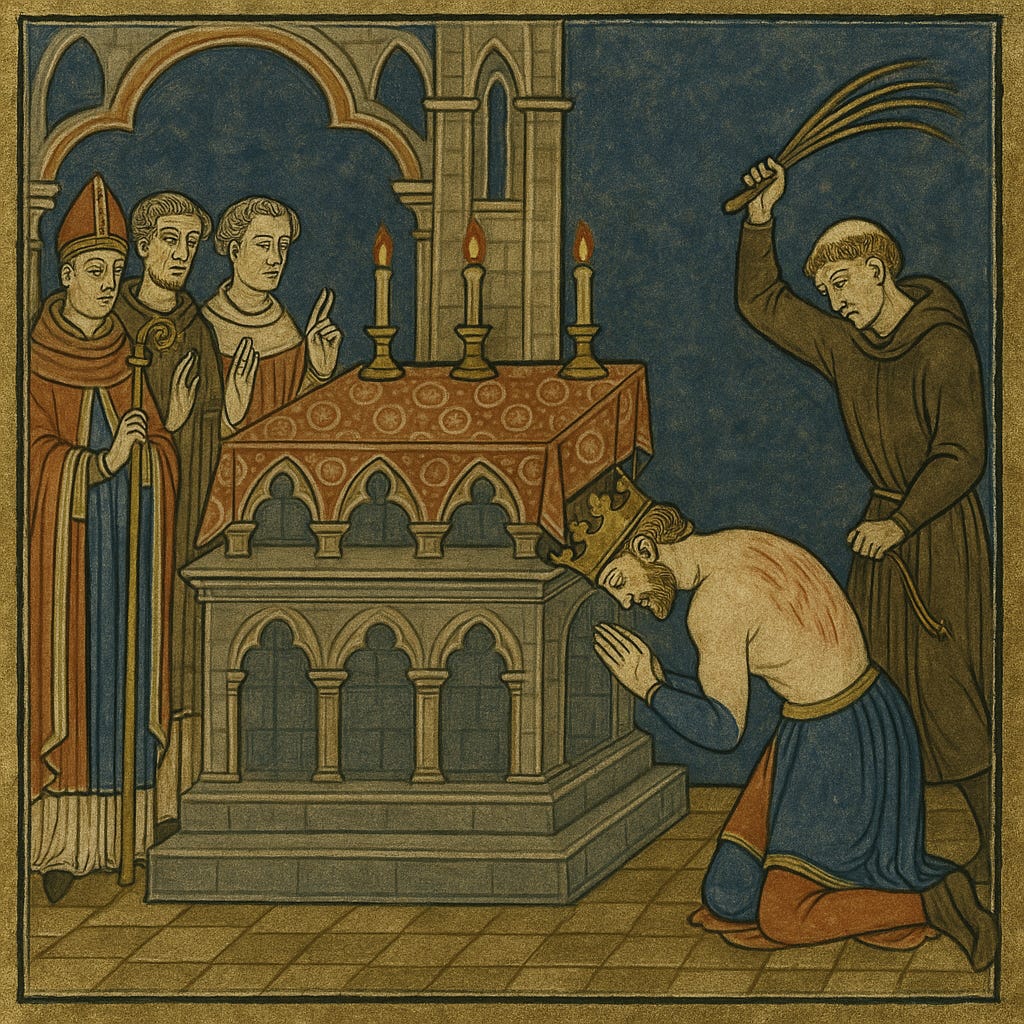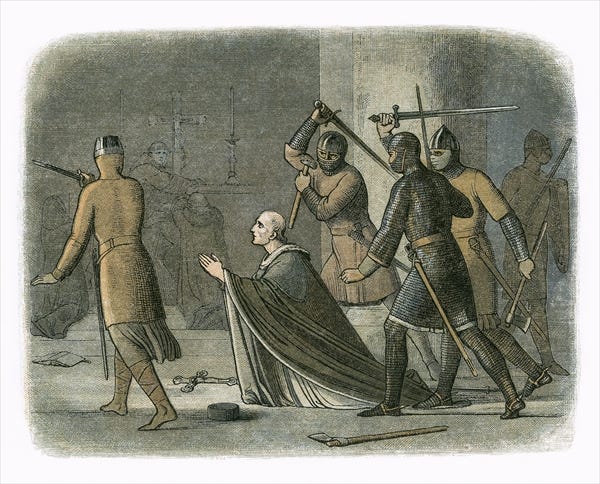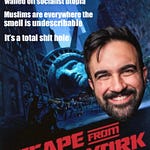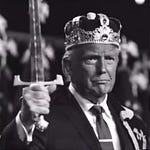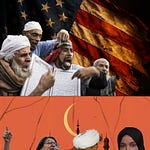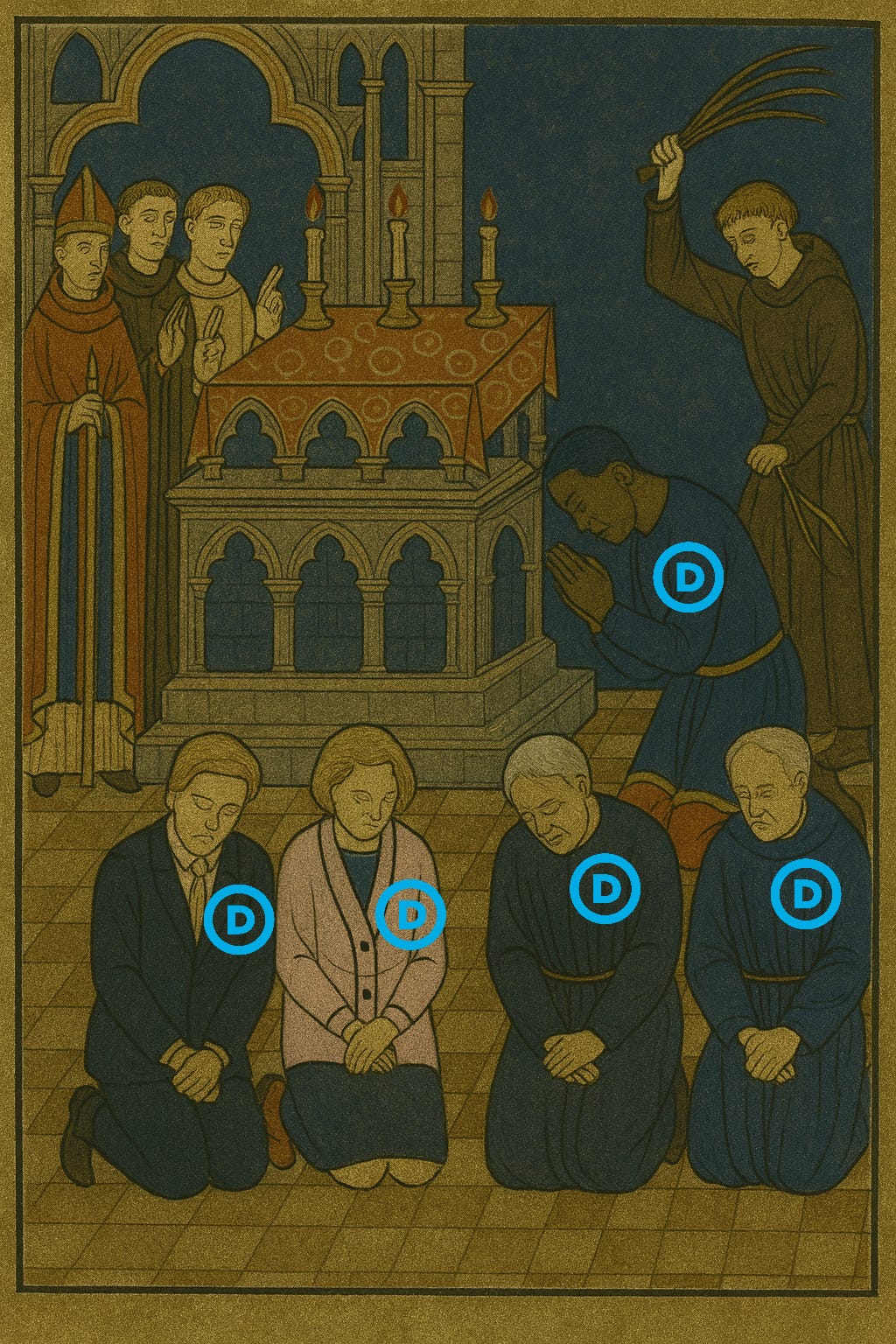
NOTE: This piece first appeared on FLGulfNews.com.
By Richard Luthmann
Those Who Forget History
George Santayana warned that those who forget history are doomed to repeat it. Today’s political tragedy has eerie historical parallels. Conservative activist Charlie Kirk was assassinated while speaking to students – a shocking act of violence that has unleashed a firestorm of blame and soul-searching.
Many on the right charge that incendiary words from Democratic leaders helped fuel an atmosphere of hate that made Kirk a target.
The furor evokes the 12th-century saga of England’s King Henry II and Archbishop Thomas a Becket. Henry’s infamous outburst – “Will no one rid me of this turbulent priest?” – was widely seen as a call to violence. Not directly a command, but enough to inspire four knights to hunt down and murder Becket in Canterbury Cathedral in 1170.
The aftermath was explosive. Henry II faced public outrage over Becket’s martyrdom. He had to do penance: walking barefoot to Becket’s tomb and submitting to lashes from monks.
That act of contrition marked a turning point, symbolically checking the absolute monarchy’s power. Becket’s martyrdom became a rallying cry to curb royal tyranny, helping lay the groundwork for Magna Carta decades later.
Now, after Kirk’s slaying, voices ask if today’s Democratic leaders will heed history’s lesson. Will they atone for heated rhetoric that some say contributed to a climate of division and violence?
Or will denial and defiance prevail, risking an unraveling of their moral authority – and perhaps the end of their political dynasty, as happened to unchecked kings of old?
A King’s Words and a Martyr’s Blood
Henry II never explicitly ordered Becket’s killing. Yet his frustrated words set tragedy in motion. Thomas a Becket, Archbishop of Canterbury, had defied Henry’s attempts to control the Church. Their feud climaxed when Henry, in a rage, allegedly muttered, “Will no one rid me of this turbulent priest?”
Knights loyal to the king took it as a green light. They stormed Canterbury Cathedral and hacked Becket to death at the altar on December 29, 1170. The murder of the unarmed archbishop shook Christendom. Shock and anger at Henry’s role swept Europe.
Though Henry hadn’t given a direct order, the blame fell squarely on him – on his reckless rhetoric that dehumanized an opponent. Pope Alexander III condemned the killing. Henry’s royal power, near absolute at that time, suddenly faced an existential crisis of legitimacy.
Under immense pressure, King Henry performed an extraordinary public penance in 1174. The mighty monarch walked barefoot through Canterbury’s streets, knelt at Becket’s tomb, and allowed 80 monks to flog him as crowds watched.
This spectacle of contrition was unprecedented. It humbled the Crown before moral law and church authority.
In the long run, Henry’s climb-down curtailed the aura of divine invincibility around English kings. Within a generation, his son King John confronted rebellious barons and was forced to seal Magna Carta in 1215 – enshrining the rule of law over royal whim.
Historians note that Becket’s martyrdom helped inspire Magna Carta’s clause defending the Church’s liberty. In other words, Henry’s intemperate words and Becket’s blood led directly to reforms that checked a ruler’s power with law.
That medieval precedent looms over today’s turmoil. Modern leaders, too, are learning that violent speech can boomerang with devastating consequences, and that even the mightiest must atone when words spill blood.
Democrats Forget Becket’s Lesson: Fiery Rhetoric Fans the Flames
In recent years, prominent Democrats have not hesitated to paint their Republican rivals in apocalyptic terms.
President Joe Biden sparked controversy by labeling Donald Trump’s “MAGA” movement as embracing “violence and hatred” and edging toward “semi-fascism.”
Vice President Kamala Harris flatly said of Trump, “Yes, I do believe he is a fascist.” She warned that he admires dictators and would be “a president who…is a fascist” if returned to power.
Hillary Clinton infamously dismissed half of Trump’s supporters as a “basket of deplorables” – people defined by “racist, sexist, homophobic, xenophobic, Islamophobic” hatred.
Even Barack Obama, typically measured, has described Trumpism as a threat to democracy.
And Senator Bernie Sanders has called Trump an authoritarian unfit for office.
This drumbeat of demonization wasn’t limited to Trump. Charlie Kirk, as a high-profile young conservative, drew intense ire from the left. Far-left activists routinely called Kirk and his followers fascists, racists, and worse.
Some Democratic politicians amped up the militant tone.
Just weeks before Kirk’s slaying, freshman Democrat Rep. Derek Tran (D-Calif.) whipped up supporters with combative exhortations.
“It’s time for us as a party to get together and fight back, punch back… and kick them when they’re down because they deserve it,” Tran declared to applause.
Such words, couched as metaphor, now sound chilling. Critics argue this “dangerous and divisive” rhetoric creates a climate of dehumanization that can spur real-world violence.
They point to Kirk’s assassination as a horrific case in point. When political opponents are branded monsters and fascists, it only takes one unhinged believer to justify taking deadly action. Kirk’s accused killer, 22-year-old Tyler Robinson, allegedly left a note vowing to “take out Charlie Kirk” and texted that he’d “had enough of his hatred.”.
Investigators say Robinson was radicalized and angered by Kirk’s conservative views on transgender issues. Robinson’s mother revealed he had “turned left politically” in the past year.
Whether or not any politician’s words directly influenced him, the toxic political climate is under scrutiny. The tragedy has forced a hard look at how inflammatory rhetoric – from calling opponents fascists to urging supporters to “fight back” – can boil over with deadly results.
Democrats Forget Becket’s Lesson: Firestorm After Kirk’s Assassination
Charlie Kirk’s murder on September 10 has detonated a political firestorm. As news spread that the conservative figurehead had been gunned down during a campus event, condemnation poured in from across the spectrum.
But sympathy quickly gave way to blame. Prominent Republicans unleashed fury at what they called the left’s role in inciting violence.
“This is definitely on the hands of the left,” fumed Senator Tommy Tuberville (R-Ala.), pointing at liberal politicians’ heated rhetoric.
“They have preached nothing but hate, nothing but violence,” Tuberville said, accusing Democrats of creating an atmosphere that led to Kirk’s assassination.
He noted he’s witnessed years of divisive talk aimed at Americans “who believe in the Constitution,” and he directly called Kirk’s murder “the fault of the left”.
Other conservatives echoed that sentiment. Sen. Lindsey Graham called the shooting “an effort by the radical left to dehumanize the MAGA movement” and warned that Democrats’ demonization of opponents is out of control.
Elon Musk blasted “The Left is the party of murder,” in a hyperbolic post after the killing. Meanwhile, some on the far left responded with ghoulish glee that only fueled the outrage.
On social media, a handful of extremists mocked Kirk even in death, citing his pro-gun stance and suggesting he brought it on himself. One platform, Bluesky, was forced to issue warnings after users celebrated Kirk’s assassination in posts.
The New York Post blasted “ghoulish Dems, liberals…blaming Charlie Kirk for his own assassination,” condemning the macabre victory laps. This macabre reaction enraged many Americans.
Even Hollywood tough-guy Arnold Schwarzenegger, a Republican moderate, voiced alarm.
“I was very, very upset that someone’s life was taken because they have a different opinion. It’s just unbelievable,” Schwarzenegger said, urging both parties to pull back from the brink.
Yet some Democrats doubled down. California State Sen. Dave Min sarcastically noted the suspect’s reported MAGA leanings and tweeted that Republicans should now address “the toxic violence of the RADICAL RIGHT” rather than blaming the left.
Elizabeth Warren lambasted “irresponsible anti-Democrat rhetoric” from the GOP in the tragedy’s wake, instead of self-reflection.
The result is a bitter war of words – exactly the cycle of hatred and retribution Kirk himself warned about. Before his death, Kirk had posted that “the political left is normalizing violence…as a legitimate means of achieving its goals.”
Now his prophecy seems fulfilled, and the nation stands on a knife’s edge, awaiting what comes next.
Democrats Forget Becket’s Lesson: Penance or Party’s End?
King Henry II’s saga did not end with punishment – it ended with penance. His public atonement for Becket’s murder helped establish the rule of law and checked the excesses of monarchy. Today, many are asking: Will America see a similar act of contrition from those in power?
Thus far, no Democratic leader has issued any mea culpa for extreme rhetoric. No one in the national Democrat Party’s upper echelons of power has renounced the language of “fascists” and “deplorables” used to describe political opponents.
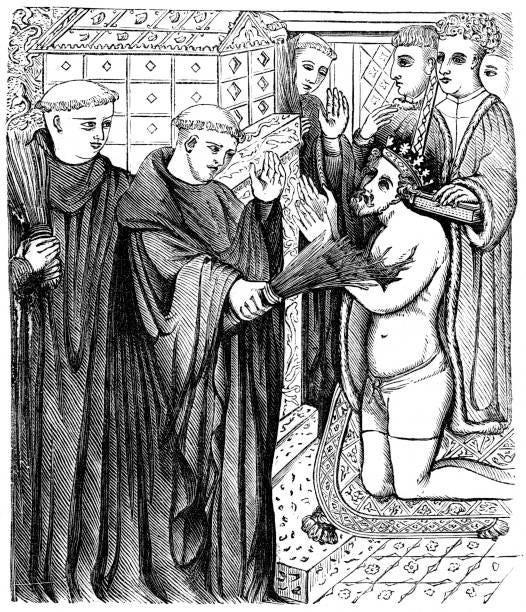
There have been no figurative sackcloth and ashes from those who spent years branding Donald Trump and his supporters as existential evils.
Instead, lines are drawn tighter. Republicans demand apologies and a tone-down. Democrats largely reject blame, insisting violent extremists are solely responsible for violent acts. The stalemate raises the stakes.
History suggests that failing to douse the flames now could consume those who fanned them. If Democrats choose defiance over atonement, they may face a crisis of legitimacy. Already, trust is eroding.
Political violence begets more violence; unchecked, it could rend the Democrat Party’s moral authority, just as Henry’s obstinacy threatened his crown. Some commentators even ask if we are witnessing the beginning of the end of the Democratic Party as we know it – a collapse under the weight of its own militant rhetoric and refusal to reaffirm the rule of law over passion.
That outcome is far from certain. But the parallels are sobering.
A martyr’s blood once forced a king to his knees and spurred a Magna Carta for liberty. Charlie Kirk’s blood now tests the conscience of a party.
The choices Democrats make in this fraught moment – whether to cool the rhetoric and seek peace, or continue the rhetorical crusade – will determine if this tragedy becomes their Becket moment of humility, or the breaking point that ushers their downfall.
History is watching, and it does not forgive those who fail to learn its lessons.




